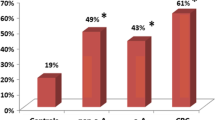Abstract
Intraepithelial bacteria were isolated by the gentamicin protection assay (GPA) from biopsy samples obtained at colonoscopy (colon cancer,n=10 patients; colonic adenoma,n=20; control group,n=20; cancer patients without gastrointestinal tract GIT malignancy,n=10). After a three-month administration ofE. faecium M-74 to patients with positive GPA biopsies, 172 biopsy specimens from 60 patients were examined with the GPA. The number of biopsies with intracellular bacteria was significantly higher in adenoma and carcinoma group than in control group (26vs. 10 %;p=0.004); in cancer patients without GIT malignancy the difference was nonsignificant.E. faecium M-74 was also administered to 5 patients with colonic adenoma; according to a control colonoscopy the number of biopsies with intracellular bacteria was significantly lower after probiotic administration (48vs. 16 %;p=0.03). A striking prevalence of intraepithelial bacteria was also showed in patients with large bowel adenoma and carcinoma. The administration of probiotic strain M-74 can thus be considered to be an effective and promising method for elimination of pathogenic bacteria in the case of inflammatory bowel disease and colon cancer.
Similar content being viewed by others
Abbreviations
- AIEC:
-
adherent-invasiveE. coli
- CFU:
-
colony-forming unit
- CRC:
-
colorectal cancer
- EIEC:
-
enteroinvasiveE. coli
- GIT:
-
gastrointestinal tract
- GPA:
-
gentamicin protection assay
- IBD:
-
inflammatory bowel disease
References
Belicová A., Križková L., Dobias J., Krajčovič J., Ebringer L.: Synergic activity of selenium and probiotic bacteriumEnterococcus faecium M-74 against selected mutagens inSalmonella assay.Folia Microbiol. 49, 301–306 (2004).
Boudeau J., Glasser A.L., Julien S., Colombel J.F., Darfeuille-Michaud A.: Inhibitory effect of probioticEscherichia coli strain Nissle 1917 on adhesion to and invasion of intestinal epithelial cells by adherent-invasiveE. coli strains isolated from patients with Crohn’s disease.Aliment.Pharmacol.Ther. 18, 45–56 (2003).
Bujňáková D., Vlková E., Rada V., Kmeť V.: Aggregation of lactobacilli and bifidobacteria withEscherichia coli O157.Folia Microbiol. 49, 143–146 (2004).
Darfeuille-Michaud A., Boudeau J., Bulois P., Neut C., Glasser A.L., Barnich N., Bringer M.A., Swidsinsky A., Beaugerie L., Colombel J.F.: High prevalence of adherent-invasiveEscherichia coli associated with ileal mucosa in Crohn’s disease.Gastroenterology 127, 412–421 (2004).
Ebringer L., Ferenčík M., Lahitová N., Kačáni L., Michálková D.: Antimutagenic and imunostimulatory properties of lactic acid bacteria.World J.Microbiol.Biotechnol. 11, 294–298 (1995).
Fedorak R.N., Madsen K.: Probiotics and the management of inflammatory bowel disease.Inflamm.Bowel Dis. 10, 286–299 (2004).
Ferenčík M., Ebringer L.: Modulatory effects of selenium and zinc on the immune system.Folia Microbiol. 48, 417–426 (2003).
Ferenčík M., Ebringer L., Mikeš Z., Jahnová E., Čižnár I.: Beneficial modification of the human intestinal microflora using orally administered lactic acid bacteria. (In Slovak)Bratisl.Lek.Listy 100, 238–245 (1999).
Glasser A.L., Boudeau J., Barnich N., Perruchot M.H., Colombel J.F., Darfeuille-Michaud A.: Adherent-invasiveEscherichia coli strains from patients with Crohn’s disease survive and replicate within macrophages without inducing host cell death.Infect.Immun. 69, 5529–5537 (2001).
Martin H.M., Campbell B.J., Hart C.A., Mpofu C., Nayar M., Singh R., Englyst H., Williams H.F., Rhodes J.M.: EnhancedEscherichia coli adherence and invasion in Crohn’s disease and colon cancer.Gastroenterology 127, 80–93 (2004).
NCCLS: Performance Standards for Antimicrobial Susceptibility Testing, 12th Informational Supplement (Document M100-S12). National Committee for Clinical Laboratory Standards, Wayne (USA) 2002.
Resta-Lenert S., Barrett K.E.: Live probiotics protect intestinal epithelial cells from the effects of infection with enteroinvasiveEscherichia coli (EIEC).Gut 52, 988–997 (2003).
Rovenský J., Švík K., Stančíková M., Ištók R., Ebringer L., Ferenčík M.: Treatment of experimental adjuvant arthritis with the combination of methotrexate and lyophilizedEnterococcus faecium enriched with organic selenium.Folia Microbiol. 47, 573–578 (2002).
Sakamoto I., Igarashi M., Kimura K., Takagi A., Miwa T., Koga Y.: Suppressive effect ofLactobacillus gasseri OLL 2716 (LGL21) onHelicobacter pylori infection in humans.J.Antimicrob.Chemother. 47, 709–710 (2001).
Swidsinsky A., Khilkin M., Kerjaschki D., Schreiber S., Ortner M., Weber J., Lochs H.: Association between intraepithelialEscherichia coli and colorectal cancer.Gastroenterology 115, 281–286 (1998).
Swidsinsky A., Ladhoff A., Pernthaler A., Swidsinsky S., Loening-Baucke V., Orther M., Weber J., Hoffman U., Schreiber S., Dietel M., Lochs H.: Mucosal flora in inflammatory bowel disease.Gastroenterology 122, 44–54 (2002).
Wollowski I., Rechkemmer G., Pool-Zobel B.L.: Protective role of probiotics and prebiotics in colon cancer.Am.J.Clin.Nutr. 73, 451–455 (2001).
Author information
Authors and Affiliations
Corresponding author
Additional information
Dedicated to Professor Ctirad John on the occasion of his 85th birthday.
The study was supported by theSlovak Agency for Support of Science and Technology (APVT) grant no. 51-010802.
Rights and permissions
About this article
Cite this article
Mego, M., Májek, J., Končeková, R. et al. Intramucosal bacteria in colon cancer and their elimination by probiotic strainEnterococcus faecium M-74 with organic selenium. Folia Microbiol 50, 443–447 (2005). https://doi.org/10.1007/BF02931427
Received:
Revised:
Issue Date:
DOI: https://doi.org/10.1007/BF02931427




